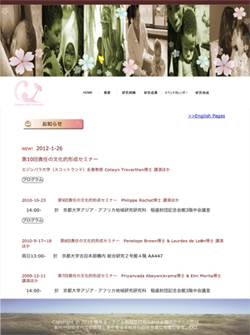プログラム・要旨:第9回 国際シンポジウムInteraction, culture, and morality(2010・10・23開催)
プログラム
Schedule
23rd October 2010 (Sat)
14:00-14:10
Introduction
Akira Takada (Kyoto University)
14:10-15:00
Developmental change of infant-caregiver vocal interaction: formation of “overlapping mode”
Yohko Shimada (Kyoto University)
15:10-16:00
Requesting Social Support in the United States and Japan
Beth Morling (University of Delaware / Kyoto University)
& Yukiko Uchida (Kyoto University)
16:10-17:40
Origins of an ethical stance
Philippe Rochat (Emory University)
18:00-20:00
Reception
This symposium is financially supported by the Grant-in-Aid for Young Scientists (S), “Cultural formation of responsibility in caregiver–child interactions” (No.19672002; Primary Investigator Akira Takada) , funded by the Japanese Ministry of Education, Culture, Sports, Science and Technology. If you have questions about the symposium, send an email to : yohko[at]mmm.mbox.media.kyoto-u.ac.jp.
Co-organized by the Center for African Area Studies, Kyoto University.
要旨
1.Yohko Shimada (Kyoto Univ.)
Developmental change of infant-caregiver vocal interaction: formation of “overlapping mode”
In adult conversation, overlapping interaction is thought to be different from alternation pattern and important as cooperative mode of communication (Kushida, 1997; Lerner, 2002; Stern, 1975). Infant-caregiver vocal interaction had frequent overlap as well as alteration in early months (Stern, 1975). Cultural formation of overlapping mode in the process of child development is needed. As a part of our longitudinal video recording of infant-caregiver interaction in Japanese families, we conducted a quantitative analysis on patterns of vocal interaction among infants, mothers, and siblings of four families. Results showed that vocal overlap occurred mainly with mother when infants were 8 month, and with sibling when they were 18 month-old. Initiator of the overlap tended to be 18 month-old infants especially when the partner was siblings. Detailed analysis conducted on 1 case from the four suggested that they made overlap mainly in nonverbal or singing-like vocal interaction. Further investigation will reveal how those patterns are shaped in the course of development, and its significance in communication studies as well as developmental psychology.
2.Beth Morling (University of Delaware / Kyoto University) & Yukiko Uchida (Kyoto University)
Requesting Social Support in the United States and Japan
Social support is a vital component of mental health in North American cultural contexts. North Americans feel comfortable asking close others for affection, advice, and instrumental support. And when North Americans receive social support, they typically feel better. However, evidence is accumulating that in Asian and Asian-American contexts, asking others for social support is not as common, desirable, or beneficial. The reason appears to be that in Asian contexts, asking others for support can threaten harmony and imposes a burden on others. In this presentation, I will discuss the cultural psychological theoretical background to the social support literature, and discuss a research project we are working on. We are using the “situation sampling” technique to study whether feelings of burden and obligation are encoded not just in individuals who ask (or not) for social support, but whether such burdens and obligations are also carried in culture-specific settings in which social support is either requested, or not. I will discuss this technique and its hypotheses. I will also welcome suggestions from the participants, who might shed more light on what it means to request and receive social support in different cultural contexts.
3.Philippe Rochat (Emory University)
Origins of an ethical stance
What are the origins of morality? It appears that the implicit manifestation of a moral sense is deeply rooted in human ontogeny, as well as in evolution. In the perspective of development, the question is how does it come about and when does it become explicit? How, when, and why do children begin to behave as agents among other agents, situated in a shared moral space: a world made of shared norms and values? I will propose that the pressure to cooperate, i.e., the necessity to operate with others, lead children toward moral agency. The lack of cooperation entails social exclusion, itself counteracting with the basic need to affiliate and the associated deep-seated and universal fear of rejection. Illustrated by some current and former studies, I try to demonstrate that cooperation viewed as the main pillar of human sociality rests on 3 pre-requisites developing from birth: a sense of self as agent in the environment, a sense of self as others, and a sense of mutuality with others. Ultimately, my goal is to illustrate that this development lead children from approximately 5 years of age to take an ethical stance, becoming principled and adopting a perspective in a moral space made of shared values. In all, I try to provide some behavioral markers to map and make sense of this development that has a unique prominence in human ontogeny.

